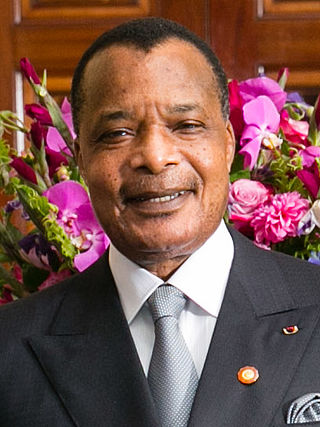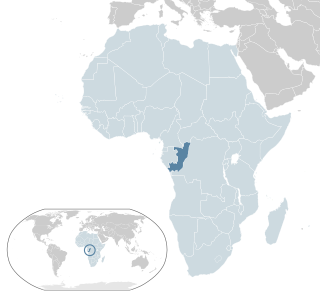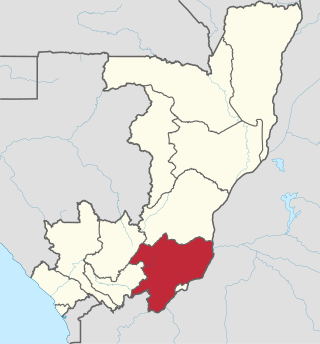Related Research Articles
The history of the Republic of the Congo has been marked by diverse civilisations: Indigenous, French and post-independence.

Pascal Lissouba was a Congolese politician who was the first democratically elected President of the Republic of the Congo and served from 31 August 1992 until 25 October 1997. He was overthrown by his predecessor and current president Denis Sassou Nguesso in the 1997 civil war.

Denis Sassou Nguesso is a Congolese politician and former military officer who became president of the Republic of the Congo in 1997. He served a previous term as president from 1979 to 1992. During his first period as president, he headed the Congolese Party of Labour (PCT) for 12 years. He introduced multiparty politics in 1990, but was stripped of executive powers by the 1991 National Conference, remaining in office as a ceremonial head of state. He stood as a candidate in the 1992 presidential election but placed third.
Jacques Joachim Yhombi-Opango was a Congolese politician. He was an army officer who became Congo-Brazzaville's first general and served as Head of State of the People's Republic of the Congo from 1977 to 1979. He was the President of the Rally for Democracy and Development (RDD), a political party, and served as Prime Minister from 1993 to 1996. He was in exile from 1997 to 2007.

The Second Republic of the Congo Civil War, also known as the Second Brazzaville-Congolese Civil War, was the second of two ethnopolitical civil conflicts in the Republic of the Congo which lasted from 5 June 1997 to 29 December 1999. The war served as the continuation of the civil war of 1993–1994 and involved militias representing three political candidates. The conflict ended following the intervention of the Angolan military, which reinstated former president Denis Sassou Nguesso to power.
Bernard Bakana Kolélas was a Congolese politician and President of the Congolese Movement for Democracy and Integral Development (MCDDI). Kolélas was a long-time opponent of the single-party rule of the Congolese Labour Party (PCT), and after the introduction of multiparty politics in the early 1990s he was one of Congo-Brazzaville's most important political leaders. He placed second in the August 1992 presidential election, behind Pascal Lissouba; subsequently he was mayor of Brazzaville, the capital, during the mid-1990s, and he briefly served as Prime Minister of Congo-Brazzaville during the 1997 civil war. After rebel forces prevailed in the civil war, he lived in exile for eight years until an amnesty made it possible for him to return; he was then elected to the National Assembly in 2007.
Jean-Blaise Kololo was a Congolese politician and diplomat who served in the government of the Republic of the Congo as Minister of Foreign Affairs and Cooperation from 1991 to 1992 as part of the transitional government of Prime Minister André Milongo.

Congo, officially the Republic of the Congo or Congo Republic, is a country located on the western coast of Central Africa to the west of the Congo River. It is bordered to the west by Gabon, to the northwest by Cameroon, to the northeast by the Central African Republic, to the southeast by the Democratic Republic of the Congo, to the south by the Angolan exclave of Cabinda, and to the southwest by the Atlantic Ocean.
Jean-Marie Tassoua is a Congolese politician. Tassoua was a militia commander during the 1997 civil war and served in the government of Congo-Brazzaville as Minister of Energy and Hydraulics from 1997 to 2002. He has been the President of the Economic and Social Council, a state institution, since 2009 and he was Co-President of the New Democratic Forces (FDN), a political party, from 2007 to 2010.
Claude-Ernest Ndalla is a Congolese politician. First coming to prominence as a radical youth leader in 1960s Congo-Brazzaville, he was one of the leading members of the Congolese Labour Party (PCT) in the period immediately following its founding in 1969, but after a few years his career fell into a long decline due to factional struggles within the PCT. Later, he served in the government of Congo-Brazzaville as Minister of Youth Redeployment and Sports from 1997 to 1999, and he has been a Special Adviser to President Denis Sassou Nguesso since 2003.
The 1990s in the Republic of the Congo, starting with a collapse of the People's Republic of the Congo single party government and the promise of multi-party democracy, gradually slid into political controversy, culminating in a 1997-99 Civil War.

The Ninjas were a militia in the Republic of the Congo, which participated in numerous wars and insurgencies in the 1990s and 2000s. The Ninjas were formed by the politician Bernard Kolélas in the early 1990s and were commanded by Frédéric Bintsamou, alias Pastor Ntoumi, when Kolelas was in exile.
Ferdinand Mbahou is a Congolese military figure who served as Congo-Brazzaville's Director of Presidential Security from 1992 to 1997, under President Pascal Lissouba.
Michel Ngakala is a Congolese military officer and politician who is a leading member of the Congolese Labour Party (PCT), the ruling party in the Republic of the Congo, serving as its Permanent Secretary for Organization. He was Commander of the Congolese People's Militia during the 1980s, and he was the High Commissioner for the Reintegration of Former Combatants, a role that involved the implementation of peace agreements with rebels, from 2001 to 2012.
Anicet Wilfrid Pandou, commonly known as Willy Matsanga, was a Congolese politician. He was a militia leader during the tumultuous events of the 1990s and later served as a Deputy in the National Assembly of Congo-Brazzaville from 2007 to 2014.

The First Republic of the Congo Civil War, also known as the First Brazzaville-Congolese Civil War, was a conflict in the Republic of the Congo which lasted from 2 November 1993 to 30 January 1994 and was between rival militias led by former politician Bernard Kolelas, former Prime Minister Pascal Lissouba, and former President Denis Sassou-Nguesso. It was one of four instances of militia fighting within the country, setting the stage for the next three conflicts in 1997, 1998–99, and 2002. The war was a direct result of unresolved claims of election fraud in the 1992 presidential election. The First Congo Civil War and the decade of conflict that followed resulted in the deaths of over 12,000 people and the displacement of 860,000 more.

The Pool War was a conflict between the Republic of the Congo and the Ninja militia in the Pool Department in the southeastern part of the country. Tensions grew between Frédéric Bintsamou and Congolese president Denis Sassou-Nguesso, after Bintsamou contested modifications to the constitution. Bintsamou was formerly a collaborator of Sassou-Nguesso.

The 2002–2003 conflict in the Pool Department was a military conflict between the government of the Republic of the Congo and the rebel Ninja militia which lasted from 2002 to 2003. It began in March 2002, when clashes between Ninja militias and the government drove thousands of civilians from their homes. On 12 March 2003, it was reported by the European Commission that the conflict had left 200,000 people "vulnerable and displaced". The conflict ended on 17 March 2003, when the government and the rebels signed a ceasefire.
The Cobra Militia, is also known as Forces Démocratique and Patriotique (FDP), was a militia during the civil war in the Republic of the Congo that fought for Denis Sassou Nguesso. Mostly recruiting from the sparsely populated northern region of the country, the Cobras numbered 8,000 at their height.
References
- ↑ "Cocoyes / Coyote Militia (aka Mamba, Zulus)". globalsecurity. Retrieved 10 August 2021.
- ↑ "Republic of Congo (Brazzaville): Information on the human rights situation and the Ninja militia | USCIS". www.uscis.gov. United States Citizenship and Immigration Service. 14 November 2000. Retrieved 11 August 2021.
- ↑ "Republic of Congo 1st Civil War". globalsecurity. Retrieved 10 August 2021.
- ↑ "Republic of Congo (Brazzaville): Information on the human rights situation and the Ninja militia". reliefweb. Retrieved 10 August 2021.
- ↑ "Republic of Congo (Brazzaville): Information on the human rights situation and the Ninja militia". reliefweb. Retrieved 10 August 2021.
- ↑ "Congo-Brazzaville: Background on militia groups". reliefweb. Retrieved 10 August 2021.
- ↑ "Armed Conflicts Report - Congo (Brazzaville)" (PDF). Ploughshares. United States Department of Justice. Archived from the original (PDF) on 18 December 2021. Retrieved 11 August 2021.